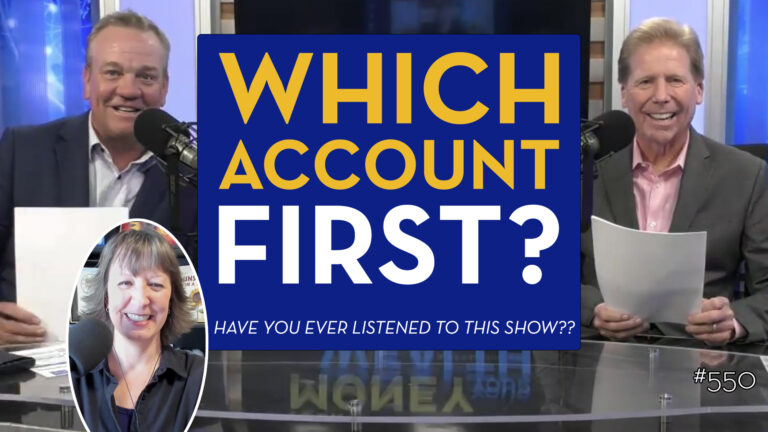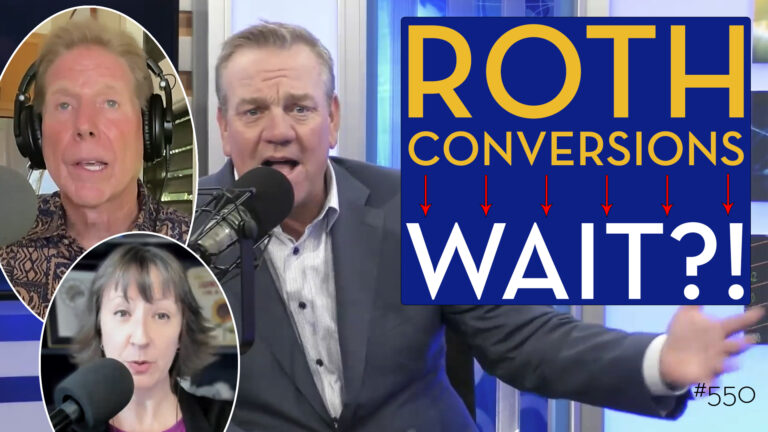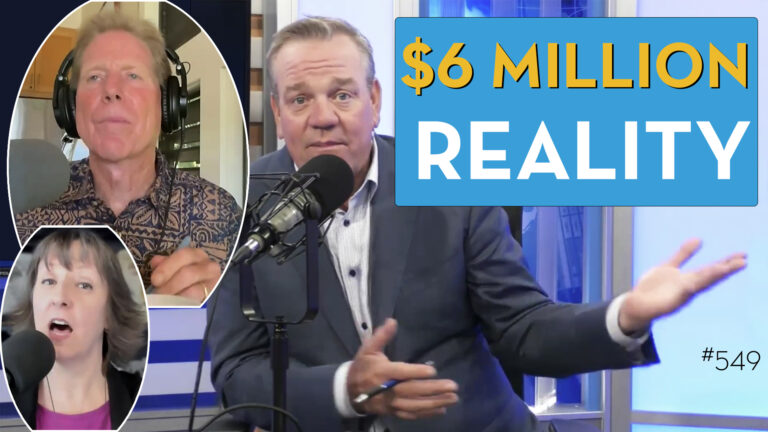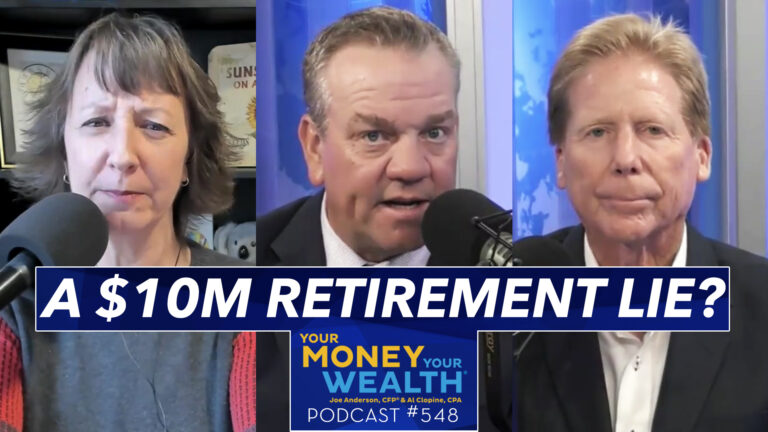Paul Sullivan joins Joe Anderson, CFP® and Alan Clopine, CPA to discuss the biggest lessons from his book The Thin Green Line: The Money Secrets of the Super Wealthy on creating and maintaining wealth. Also in this hour: answers to financial questions. Original publish date January 14, 2017 (hour 2). Note that content may be outdated as rules and regulations have changed.
2:38 “[With] the 60-day rollover, you can only do one per year for all of your IRAs (individual retirement accounts) so all of your IRAs are considered to be one account.”
4:18 “I don’t think this one is widely known, and when you have a 401(k) that has company stock and you roll it over into your IRA, you completely lose a strategy called net unrealized appreciation (NUA).”
6:33 “Taxes don’t stop when your paycheck does, in fact you’ll notice when you start taking money out of your 401(k) or your IRA, you have to pay regular ordinary income taxes on that, and when you turn 70 ½, you have to take a required minimum distribution whether you want to or not. As you near retirement, tax planning becomes more important than ever, but you must use a forward-thinking tax strategy.”
8:07 Start of Interview with Paul Sullivan
Joe: (8:30) “Tell us the genesis of the book. It’s the secrets of the ultra-wealthy – what did you learn and what are some of the things that we can give to our listeners?”
Paul: (8:58) “The gist of the book is this: how we think about money matters more than anything else…”
Joe: (10:15) “How did you come up with the title?”
Paul: (10:20 “If you think about the S&P 500 or your favorite stock index over the past 50 years – it starts low, goes high but it’s not in a straight line, it’s a little bumpy along the way. That’s the thin green line; the people who are on top of it – they’re wealthy, whether they make a little money or a lot of money. Everybody else is rich and poor so you could be at the very tippy top making a ton of money each year but you’re really rich. The difference is freedom. The people who are wealthy are able to make all the decisions and choices that they want to make with their money. They’re in control, they control life.
10:57 “The people who are rich – you can think in the most simple context – is someone who is wildly over-leveraged. They may make $1 million a year but they have $5 million in debt obligations. Life is going to control them.”
Joe: (11:51) “So wealthy is not necessarily a dollar figure in your bank account – it’s basically the control that you have within the wealth you’ve created.”
Paul: (12:13) “It’s all about having those choices and knowing that when you make them you’re not endangering some of the essential things in your life.”
Joe: (15:01) “Give us some tidbits about your own personal journey.”
Paul: (15:54) “It’s been an interesting journey but it gives me perspective on [the fact that] it (wealth) can go away, how do you make sure it does go away and more importantly, how do I talk to my kids and my kids’ friends so they understand that a lot of this is decisions and being aware of the decisions you make; and just as important is your behaviors.”
17:27 “You can save money, you can spend money, you can give it away – but most importantly, you can think about it, and it’s how those four work together that I hope will allow people to make better decisions in their own lives.”
19:35 “The Château Margaux is something I like, but if I’m going to have it once a year, there are other decisions I’m going to have to make to offset the splurge for that amazing bottle of French wine.”
Joe: (20:02) “Where can people find more information about you?”
Paul: (20:04) “Go to my website: pauljsullivan.com or go to the New York Times website and type in my name.”
20:23 End of Interview with Paul Sullivan
25:00 “I have a beneficiary IRA that I doubled by investing in Apple Stock. I now have sold 90% of that stock because I felt it was too risky to have all my eggs in one basket. I would like to primarily live off of the interest and not touch the principal ($900K) of my IRA. How would you suggest I invest to accomplish that? How should I invest for the long term inside my IRA?”
26:07 “I would look at this as more of a total return; I would look at a globally diversified portfolio total return, not just income.”
29:11 “Should I diversify between different financial institutions? As a high net worth individual, should I diversify between financial institutions or should I just diversify within one organization such as Wells Fargo or Chase?”
30:55 “Well what if Chase or Wells Fargo goes out of business? You’re investing in a security versus a bank.”
33:56 “What tax rate will my mother have to pay on a cashed out IRA? I have a terminally ill mother who is 69 years old. She has a traditional IRA worth around $500K that she converted to an annuity at 4%. Her medical care requires increased cash flow to pay day-to-day bills. The company has agreed to cash out the full value of the IRA with 0 surrender fees. The company will not transfer the IRA to any other investment vehicle. If she takes the cash value, what are the tax implications? Her income last year was ~$30K and her effective combined federal and state tax rate was ~3%. Will she pay 3% on the $500K or the full federal and state rate of 41% (FED ~35 NC ~6)?”
34:55 “If you cash out an annuity, and the company is allowing you to do that without surrender, it can still stay out of an IRA.”
35:37 “When you have effective rates like 3%…when you add additional income, now you’re on the marginal rate concept which means whatever tax bracket you’re currently in…that’s actually the tax you’re going to pay on the additional income.”
*Email questions from Investopedia Advisor Insights
Listen to the YMYW podcast:

Amazon Music
AntennaPod
Anytime Player
Apple Podcasts
Audible
Castbox
Castro
Curiocaster
Fountain
Goodpods
iHeartRadio
iVoox
Luminary
Overcast
Player FM
Pocket Casts
Podbean
Podcast Addict
Podcast Index
Podcast Guru
Podcast Republic
Podchaser
Podfriend
PodHero
podStation
Podverse
Podvine
Radio Public
Rephonic
Sonnet
Spotify
Subscribe on Android
Subscribe by Email
RSS feed

YouTube Music
IMPORTANT DISCLOSURES:
Pure Financial Advisors is a registered investment advisor. This show does not intend to provide personalized investment advice through this broadcast and does not represent that the securities or services discussed are suitable for any investor. Investors are advised not to rely on any information contained in the broadcast in the process of making a full and informed investment decision.
• Investment Advisory and Financial Planning Services are offered through Pure Financial Advisors, LLC, a Registered Investment Advisor.
• Pure Financial Advisors LLC does not offer tax or legal advice. Consult with your tax advisor or attorney regarding specific situations.
• Opinions expressed are not intended as investment advice or to predict future performance.
• Past performance does not guarantee future results.
• Investing involves risk including the potential loss of principal. No investment strategy can guarantee a profit or protect against loss in periods of declining values.
• All information is believed to be from reliable sources; however, we make no representation as to its completeness or accuracy. As rules and regulations change, content may become outdated.
• Intended for educational purposes only and are not intended as individualized advice or a guarantee that you will achieve a desired result. Before implementing any strategies discussed you should consult your tax and financial advisors.
CFP® – The CERTIFIED FINANCIAL PLANNER™ certification is by the Certified Financial Planner Board of Standards, Inc. To attain the right to use the CFP® designation, an individual must satisfactorily fulfill education, experience and ethics requirements as well as pass a comprehensive exam. Thirty hours of continuing education is required every two years to maintain the designation.
AIF® – Accredited Investment Fiduciary designation is administered by the Center for Fiduciary Studies fi360. To receive the AIF Designation, an individual must meet prerequisite criteria, complete a training program, and pass a comprehensive examination. Six hours of continuing education is required annually to maintain the designation.
CPA – Certified Public Accountant is a license set by the American Institute of Certified Public Accountants and administered by the National Association of State Boards of Accountancy. Eligibility to sit for the Uniform CPA Exam is determined by individual State Boards of Accountancy. Typically, the requirement is a U.S. bachelor’s degree which includes a minimum number of qualifying credit hours in accounting and business administration with an additional one-year study. All CPA candidates must pass the Uniform CPA Examination to qualify for a CPA certificate and license (i.e., permit to practice) to practice public accounting. CPAs are required to take continuing education courses to renew their license, and most states require CPAs to complete an ethics course during every renewal period.










